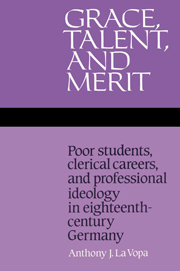 Grace, Talent, and Merit
Grace, Talent, and Merit 3 - The patronage chain: structure and ideology
Published online by Cambridge University Press: 26 March 2010
Summary
The climb up the academic ranks to a clerical appointment was also an advance along a patronage chain, formed by the men who singled out bright boys without means, distributed the public and private charity that made possible their studies, and filled vacancies in clerical and teaching offices. These sponsors represented a many-tiered hierarchy of wealth, status, and institutional authority, both within the educated Bürgertum and in the social networks binding it to other groups. For poor boys, the corporate initiation into the clergy was also an experience of class inequality on more or less polarized terms. The social hinge in the initiation, patronage was also an instrument of class power.
The actual workings of patronage in eighteenth-century society have received little attention, despite its obvious importance in both securing the advantages of birth and creating channels for merit. Instead class inequality has been conceived as a static hierarchy of wealth and power, and quantitative research has demonstrated how academic education reflected and perpetuated a social “structure” in this sense, above all by overrepresenting an academic and official elite and virtually excluding groups at the bottom. In the workings of patronage – in the skeins of personal ties and mutual loyalties between sponsors and poor boys – class can be comprehended as a process, a series of one-to-one relationships with a formative impact on consciousness. Clearly structural realities underlay those relationships and lent them coercive force; but it was cultural norms, at once sanctioning inequality and setting limits to its terms, that made patronage seem a legitimate exercise of authority rather than an abuse of power.
- Type
- Chapter
- Information
- Grace, Talent, and MeritPoor Students, Clerical Careers, and Professional Ideology in Eighteenth-Century Germany, pp. 83 - 110Publisher: Cambridge University PressPrint publication year: 1988


